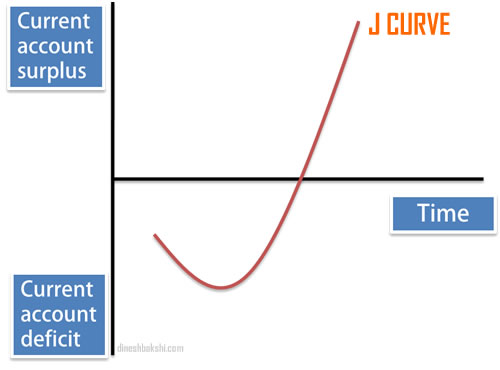Marshall-Lerner Condition and J Curve
The Marshall-Lerner condition is at the heart of the elasticities approach to the balance of payments. It is named after the economists who discovered it independently: Alfred Marshall (1842-1924), Abba Lerner (1903-82).
The condition seeks to answer the following question: when does a real devaluation (in fixed exchange rates) or a real depreciation (in floating exchange rates) of the currency improve the current-account balance of a country?
The Marshall-Lerner condition states that a real devaluation (or a real depreciation) of the currency will improve the trade balance if the sum of the elasticities (in absolute values) of the demand for imports and exports with respect to the real exchange rate is greater than one,
Exportsped+Importsped > 1
J Curve
A country's trade balance experiences the J-curve effect if its currency becomes devalued. At first, the country's total value of imports (goods purchased from abroad) exceeds its total value of exports (goods sold abroad), resulting in a trade deficit. But eventually, the currency devaluation reduces the price of its exports. Consequently, the country's level of exports gradually recovers, and the country moves back to a trade surplus.

Rationale behind J-Curve
Immediately following the depreciation or devaluation of the currency, the volume of imports and exports may remain largely unchanged due in part to pre-existing trade contracts that have to be honoured. Moreover, in the short run, demand for the more expensive imports (and demand for exports, which are cheaper to foreign buyers using foreign currencies) remain price inelastic. This is due to time lags in the consumer's search for acceptable, cheaper alternatives (which might not exist).
Over the longer term a depreciation in the exchange rate can have the desired effect of improving the current account balance. Domestic consumers might switch their expenditure to domestic products and away from expensive imported goods and services, assuming equivalent domestic alternatives exist. Equally, many foreign consumers may switch to purchasing the products being exported into their country, which are now cheaper in the foreign currency, instead of their own domestically produced goods and services





